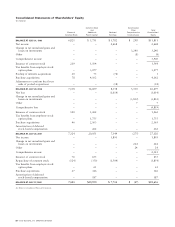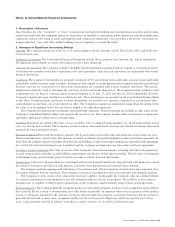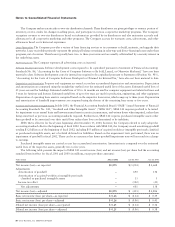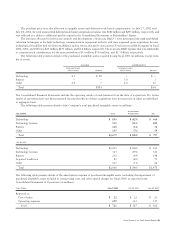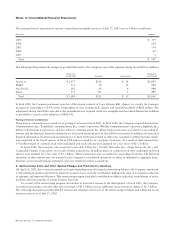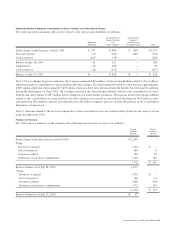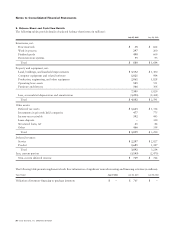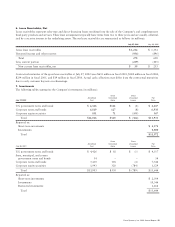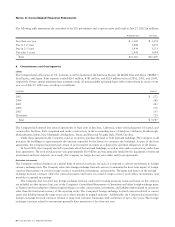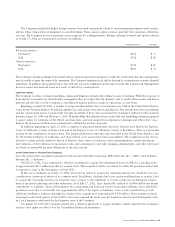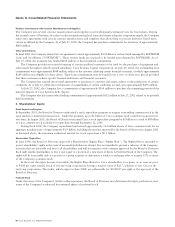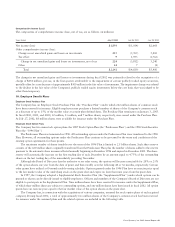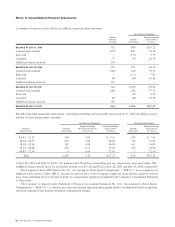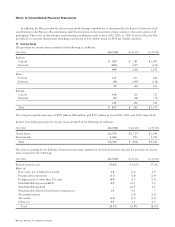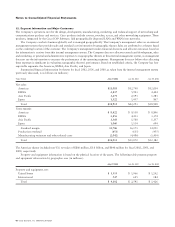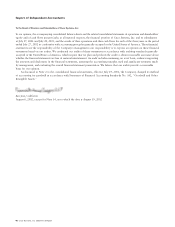Cisco 2002 Annual Report Download - page 40
Download and view the complete annual report
Please find page 40 of the 2002 Cisco annual report below. You can navigate through the pages in the report by either clicking on the pages listed below, or by using the keyword search tool below to find specific information within the annual report.
Notes to Consolidated Financial Statements
38 Cisco Systems, Inc. 2002 Annual Report
The following table summarizes the maturities of the U.S. government and corporate notes and bonds at July 27, 2002 (in millions):
Amortized Cost Fair Value
Less than one year $ 3,160 $ 3,172
Due in 1-2 years 1,608 1,636
Due in 2-5 years 3,439 3,553
Due after 5 years 2,958 3,044
Total $11,165 $11,405
8. Commitments and Contingencies
Leases
The Company leases office space in U.S. locations, as well as locations in the Americas; Europe, the Middle East, and Africa (“EMEA”);
Asia Pacific; and Japan. Rent expense totaled $265 million, $381 million, and $229 million in fiscal 2002, 2001, and 2000,
respectively. Future annual minimum lease payments under all noncancelable operating leases with an initial term in excess of one
year as of July 27, 2002 were as follows (in millions):
Fiscal Year Amount
2003 $ 272
2004 260
2005 221
2006 170
2007 135
Thereafter 729
Total $ 1,787
The Company had entered into several agreements to lease sites in San Jose, California, where its headquarters is located, and
certain other facilities, both completed and under construction, in the surrounding areas of San Jose, California; Boxborough,
Massachusetts; Salem, New Hampshire; Richardson, Texas; and Research Triangle Park, North Carolina.
Under these agreements, the Company could, at its option, purchase the land or both land and buildings. The Company could
purchase the buildings at approximately the amount expended by the lessors to construct the buildings. As part of the lease
agreements, the Company had restricted certain of its investment securities as collateral for specified obligations of the lessors.
In fiscal 2002, the Company elected to purchase all of the land and buildings, as well as sites under construction, under these
lease agreements. The total purchase price was approximately $1.9 billion and was primarily funded by the liquidation of restricted
investments and lease deposits. As a result, the Company no longer has any sites under such lease agreements.
Derivative Instruments
The Company conducts business on a global basis in several currencies. As such, it is exposed to adverse movements in foreign
currency exchange rates. The Company enters into foreign exchange forward contracts to minimize the short-term impact of foreign
currency fluctuations on certain foreign currency receivables, investments, and payables. The gains and losses on the foreign
exchange forward contracts offset the transaction gains and losses on certain foreign currency receivables, investments, and
payables recognized in earnings.
The Company does not enter into foreign exchange forward contracts for trading purposes. Gains and losses on the contracts
are included in other income (loss), net, in the Company’s Consolidated Statements of Operations and offset foreign exchange gains
or losses from the revaluation of intercompany balances or other current assets, investments, and liabilities denominated in currencies
other than the functional currency of the reporting entity. The Company’s foreign exchange forward contracts related to current
assets and liabilities generally range from one to three months in original maturity. Additionally, the Company has entered into
foreign exchange forward contracts related to long-term customer financings with maturities of up to two years. The foreign
exchange contracts related to investments generally have maturities of less than one year.


